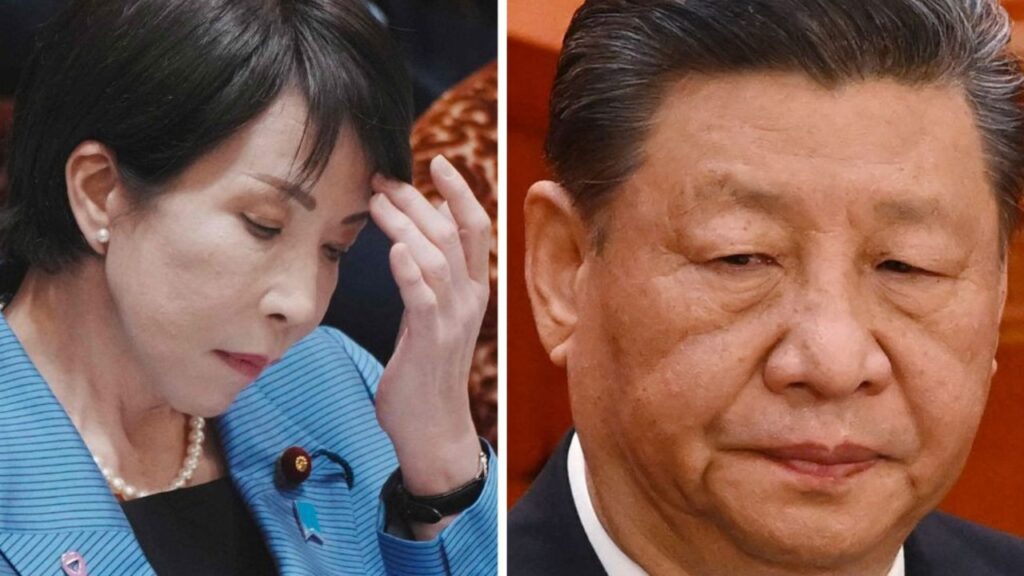
When Japanese Prime Minister Sanae Takaichi addressed the growing tensions surrounding Taiwan, her remarks triggered a diplomatic stir that reverberated far beyond the Japanese parliament. Last week, Takaichi stated, “If a Taiwan emergency entails battleships and the use of force, then that could constitute a situation threatening the survival of Japan, any way you slice it.” Her comments underscored the gravity of the situation, suggesting that the so-called Taiwan contingency has become so serious that Japan must prepare for the worst-case scenario.
The announcement comes as China continues to assert its claim over Taiwan under the “One China” principle, which views Taiwan as an integral part of China. The Chinese Communist Party (CCP) has consistently rejected any moves towards Taiwanese independence or international recognition of Taipei as a separate state. Historically, Taiwan was under Japanese rule until 1945, adding layers of complexity to the current geopolitical tensions.
Japan’s Strategic Concerns
Takaichi, known for her forthright stance on regional security, has expressed concerns that any aggressive move by China towards Taiwan could spark a national security crisis for Japan. Her comments have been perceived as provocative by Beijing, which has signaled its willingness to take extraordinary measures to assert control over Taiwan.
Japan’s security policy allows for military action only in the face of an existential threat. However, with Taiwan situated just 100 kilometers from Japan’s nearest island, the potential for conflict spillover is a growing concern. Takaichi’s ties to the late Prime Minister Shinzo Abe, a vocal critic of China’s military expansion, further highlight her apprehensions about China’s increasing influence in the Asia-Pacific region.
Diplomatic Tensions and Economic Implications
Despite a seemingly cordial meeting with Chinese President Xi Jinping at the APEC summit, Takaichi’s previous visits to Taiwan and meetings with Taipei officials have strained Japan-China relations. The diplomatic friction escalated when a Chinese diplomat reportedly made a threatening remark about Takaichi, and Beijing issued a travel advisory cautioning Chinese citizens against visiting Japan.
Japan’s Chief Cabinet Secretary Minoru Kihara criticized China’s travel advisory as “incompatible with the broader direction agreed upon by the leaders of the two nations.” The advisory, along with reports of Chinese coast guard vessels entering Japanese territorial waters near the disputed Senkaku Islands, has intensified the diplomatic row.
Economic Fallout
The economic impact of the diplomatic tensions is significant, given the intertwined nature of Japan and China’s economies. China is Japan’s largest source of foreign visitors, with nearly 7.5 million arrivals in the first nine months of 2025. The travel advisory has led to a sharp decline in Japanese tourism and retail stocks, with investors reacting swiftly to the potential loss of Chinese tourists.
Chinese travelers spent 590 billion yen (A$5.8 billion) in Japan during the third quarter, accounting for approximately 28% of all foreign tourist spending.
Despite the weak yen making Japan an attractive shopping destination, the travel advisory has affected market confidence. Cosmetics giant Shiseido saw its share price drop by 11.4%, while department store operator Takashimaya and Pan Pacific, owner of the popular Don Quijote stores, experienced significant declines. Fast Retailing, the parent company of Uniqlo, also faced a nearly six percent drop in its stock value.
Looking Ahead
The diplomatic and economic tensions come at a precarious time for Japan, whose economy contracted by 0.4% in the third quarter of 2025. As Japan navigates these challenges, the implications of Takaichi’s comments and the subsequent fallout underscore the delicate balance of power in the Asia-Pacific region.
Moving forward, Japan must carefully manage its relationship with China while addressing its national security concerns. The situation remains fluid, with potential for further developments as both nations navigate this complex geopolitical landscape.






